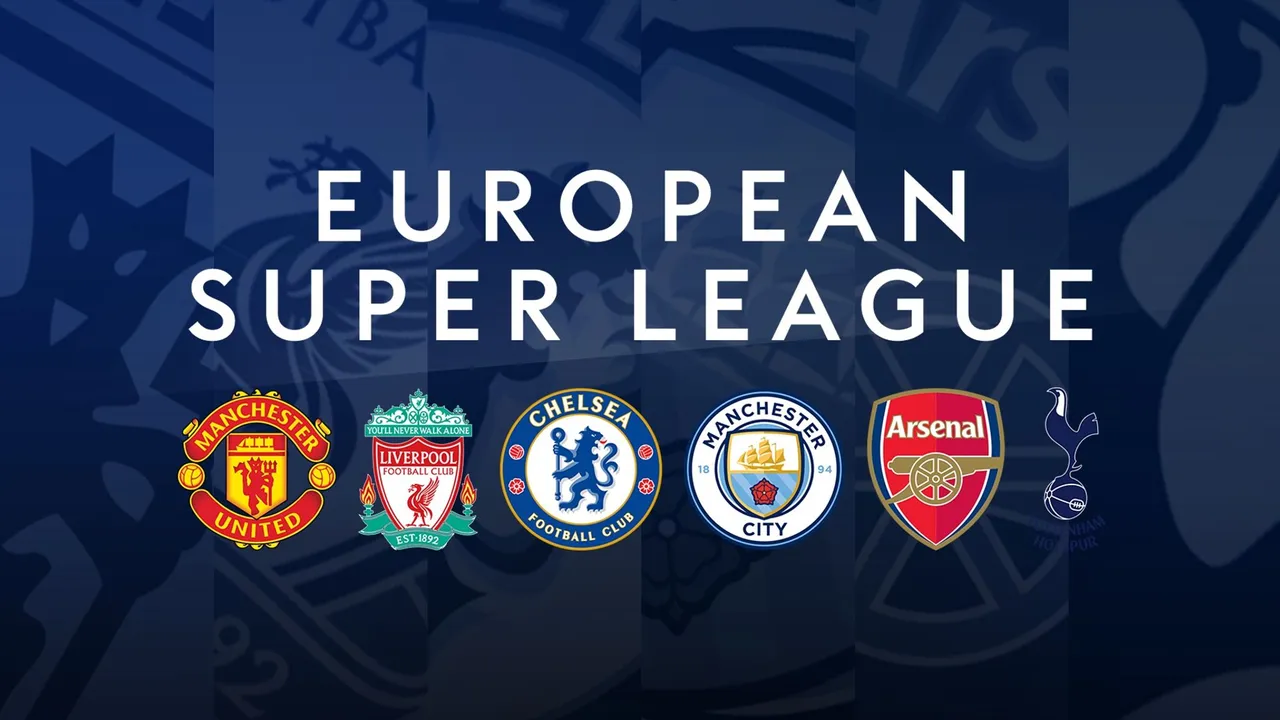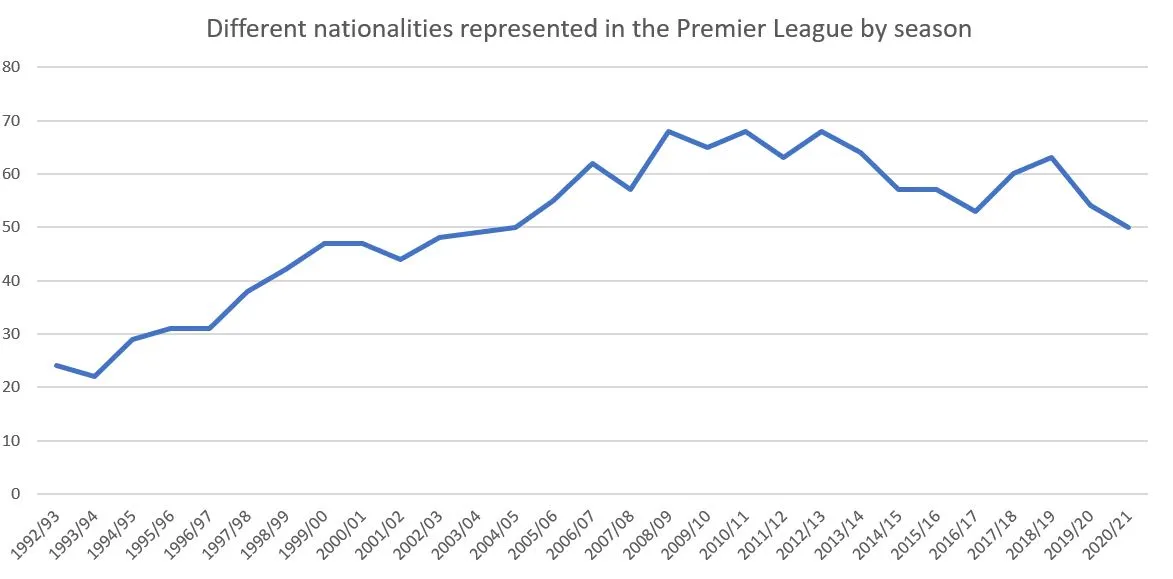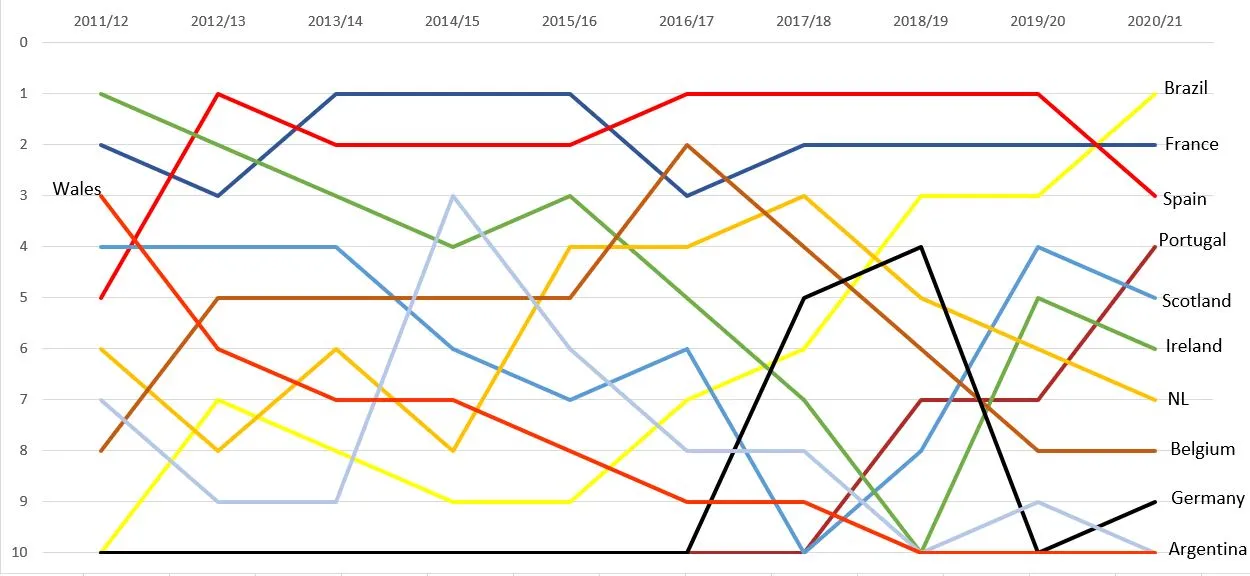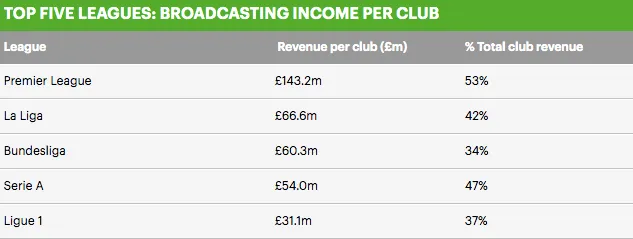We are fast heading towards the 1 year anniversary of the announcement by several of the Premier League's biggest clubs that they were planning on joining a new European Super League.

Arsenal, Chelsea, Liverpool, Manchester City, Manchester United and Spurs joined AC Milan, Atletico Madrid, Barcelona, Inter, Juventus and Real Madrid as founding members of this elite break-away league in an action that would shake European football to its very core.
In the aftermath of the announcement, there was general uproar from many supporters of those clubs as well as other fans across the continent who saw the move as not only a shameless money grab by the already rich and powerful (which it was) but also a betrayal of football's traditional working class roots within the communities that had given birth to those clubs.
The later argument against the formation of a European Super League has always made me chuckle a little and begs the question as to which game these supporters had been watching for the last 20 odd years?
This blog will look specifically at the rise and growing importance of foreign players in England's top tier since the creation of the Premier League as well as the league's increasing reliance on a global audience before concluding that the last 3 decades have laid the foundations for the inevitable formation of a European Super League in the future.
The growth in overseas stars
Up until the 1970's, English football had always resisted the influence of foreign players with the FA requiring anyone who wished to play in the Football League to have been resident in the UK for a minimum of 2 years. This move severely limited the number of non-British and Irish players who could ply their trade in the "home of football" and lasted until 1978 when under freedom of movement laws the European Union effectively made this residency requirement illegal for nationals from other member states. From that point on, a steady and ever increasing number of non-British and Irish players has made its way into English football.

Number of different nationalities to play in each Premier League season
Fast-forward to the inaugural season of the Premier League in 1992/93 and you'd find 23 nationalities represented in England's top flight including 15 Scandinavians, 3 players each from the USA and Canada and a smattering of other, mainly North or Western Europeans, plying their trade for English clubs.
What is very noticeable at that point is that there was not a single South American playing in the Premier League! In fact, we had to wait until the Premier League's 3rd season to see one in the form of Adrian Paz, an attacking midfielder from Uruguay who spent a solitary and fairly unspectacular season at Ipswich Town contributing a single Premier League goal in his 17 outings. Kudos to anyone who remembers him because I certainly don't!
Indeed in the Premier League's early years, even some of the more exotic sounding nationalities from West Africa and The Caribbean were represented by players born and bred in the UK albeit to families that had emigrated to these shores in years gone by.
Over the years though that trend would change and foreign players would take on an ever increasing significance for Premier League sides both in terms of success on the pitch but also in the league's attempts to market itself to a global audience.

Mins per season by Home Nations and Ireland - first 3 seasons of EPL excluded as they contained 22 teams each
A general downwards trend for the minutes available to home grown players has been in existence ever since the Premier League began although over the last couple of seasons, there is evidence to suggest that particularly English players are getting more of a look in at clubs with the 281K mins played by them in the Premier League the highest it has been since the 2005/06 season, a trend that looks likely to continue in the 2021/22 season.
In fact as a nation you could probably argue that England are benefiting most from the emergence of the Premier League as a de facto European super league, a fact born out by their recent success at major tournaments.
However, the same can't be said of most other home nations with Wales and Ireland seeing their players' exposure severely limited and if the trend continues this season (which it seems likely to do) then both nations are on course for a record low number of minutes for their players within the top league in world football.
So what is limiting Premier League exposure for players from those countries? As the graph below shows it's not actually a growing variety in nationalities playing in the Premier League with the numbers of different countries represented actually falling in recent years. Instead, it's the growing number of players coming from other tier 1 leagues across Europe as well as South America that is changing the face of the Premier League.
As I've already alluded to above, back in the 1990s the league generally attracted players from Scandinavia as opposed to places like Spain and that was understandable given the style of football that sides played back then. At best, it could be described as "direct" at worst "long-ball" and it didn't suit many of our cousins from the nearby continent.
That trend started to change around the turn of the century when Arsene Wenger built his great Arsenal team around recruits largely from France and began to instigate a style of play that relied more on possession than hoofing it forward. Since then English football has changed from being a backwater of outdated ideas and sentiments to one where the best coaches in the world look to take the next leap forward in football tactics.
That of course has lead to greater recruitment from markets around the world as sides look for the type of player who can fit those styles of play. Out have gone the Welsh, Irish and Scottish players generally seen as hard nosed, tough tackling and great for a cold wet and windy night in Stoke and in have come Spaniards, Germans, Italians and Brazilians and their silky, far more marketable names and skill sets.

Ranking most mins per EPL season by non-English players - over the last decade, Brazil, France and Spain have replaced Ireland, Scotland and Wales as the Premier League's nations of choice for player recruitment
The shift from a local to a global audience
However, it's not just the style of play that has attracted these players, it's also the money and status that the Premier League can provide especially in contrast to other top European Leagues which are generally struggling to compete with the biggest English clubs in that regard. For the first couple of decades of its existance the Premier League faced tough competition from the likes of La Liga and Serie A as well as few other leagues across Europe but in recent years those competitions have hit a wall in regards global appeal and TV revenue whereas the Premier League's have continued to grow.
Of course, we'd be naive to think that this growth will last forever and the very idea of a break away European Super League demonstrates that the top English clubs can see the writing on the wall especially as the table above shows they are more reliant on TV revenue than sides in other leagues.
At it's core what the European Super League shows is that even with an ever expanding base of foreign players and the attractive styles of play that the Premier League now offers, it's still pretty difficult to market Burnley vs Brighton to a home audience let alone a foreign one!
So what games then do people want to watch?
I'd guess Man City vs Real Madrid or Liverpool vs AC Milan or Manchester United vs Barcelona, etc, etc,
These 3 games alone would likely draw global audiences greater than all the Premier League matches not featuring any of the top 6 sides played across an entire season!
The European Super League then may have received strong opposition from some quarters but at least from the point of view of global viewing figures, people are voting with their remotes.
As far as protecting English football's traditional roots and values, I'm afraid that not only has the horse already bolted but it's across the field, over the fence and galloping off into the sunset.
The Premier League is only an English league in as much as the matches are played in this country. Its player base is no longer recruited from the home nations and its audience are no longer drawn from the working class in the club's home town.
News of the latest Champions League TV deal which is the region of 15billion Euros has been heralded by some as the final nail in the coffin of the European Super League but the reality is that this vast sum of money only underlines what a global audience wants to see!

Heading from The Times this week
The bigger problem for UEFA will be when the next round of TV bidding comes and they face exactly the same problem as the top domestic leagues around Europe, namely how can they demand a bigger price for what is essentially the same product?
They could expand the Champions League and show more and more games but it's not quantity that people are interested in. Much the same with the difficulty that the Premier League has in marketing the likes of Burnley vs Brighton, UEFA are going to struggle to convince broadcasters in emerging markets to pay more for more matches between Sparta Prague vs Feyenoord!
Ultimately, what will happen is that the clubs that are responsible for driving the increased revenue including those within the original break-away Super League will demand an ever increasing slice of the pie and UEFA will be forced one way or the other to give it to them. This is of course exactly what happened in 1992 with the formation of the Premier League itself as big clubs sort greater control when it came to negotiating TV deals that directly benefited them.
It probably won't happen this year, or the next or maybe not even this decade but eventually history will repeat itself and UEFA and the various national bodies will either have to come up with a solution or in the true evolutionary sense of things they will become extinct when clubs once again take matters into their own hands.
All graphs my own created from data available on transfermarkt
